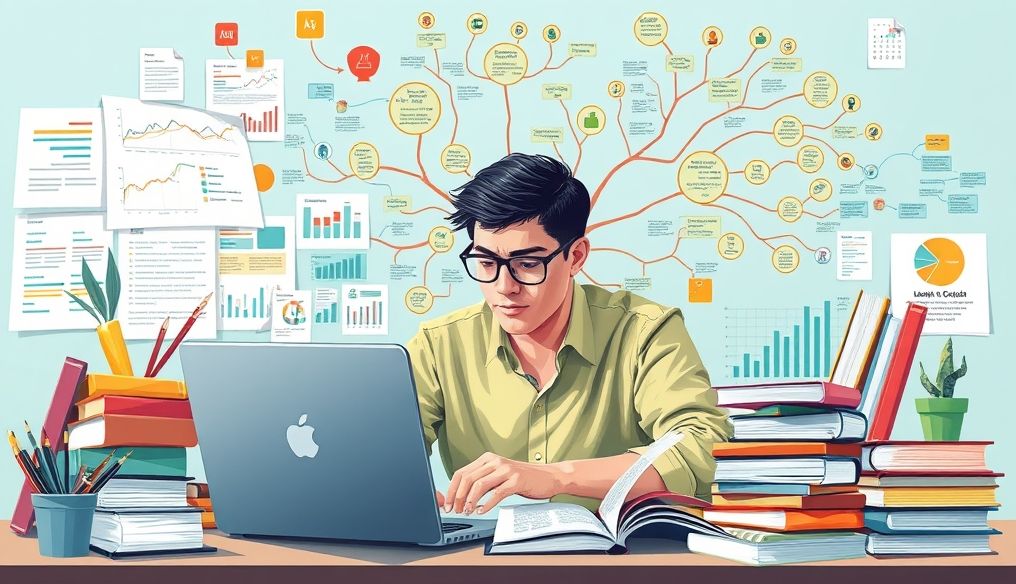Introduction: Rapid Learning - Fact or Fiction?
In today's rapidly changing world, continuous learning has become a necessity. The ability to acquire new skills and knowledge quickly and efficiently is a real competitive advantage. But is rapid learning just an innate talent that some possess, or is it a skill that can be acquired and developed?
This article will explore this question in depth, reviewing the latest research in neuroscience and psychology, as well as practical strategies and techniques you can apply to improve your learning ability.
Chapter 1: Neuroscience and Learning - How Does Your Brain Work?
To understand how to accelerate learning, it's essential to first understand how the brain works. The human brain is a highly complex device, but it is also remarkably flexible and adaptable. This flexibility, known as neuroplasticity, is the foundation of our ability to learn and adapt to the environment.
When we learn something new, new neural connections are formed in the brain. The more we use these connections, the stronger and more established they become. This process, known as "synaptic strengthening," is what allows us to remember new information and skills.
The Importance of Sleep for Learning
Sleep plays a crucial role in the learning process. During sleep, the brain processes the information we learned during the day and stores it in long-term memory. Sleep deprivation can hinder the learning process and reduce our ability to concentrate and pay attention.
- Tip: Make sure you get enough sleep (7-8 hours) each night to improve your learning ability.
Chapter 2: Active Learning Strategies
Active learning is a learning approach that focuses on actively engaging the learner in the learning process. Instead of just listening to lectures or reading books passively, active learning encourages learners to ask questions, participate in discussions, solve problems, and apply new knowledge.
Examples of active learning strategies:
- Summarizing: Summarize the information you have learned in your own words.
- Teaching: Try to explain the concepts you have learned to someone else.
- Problem Solving: Apply new knowledge to solve practical problems.
- Discussion: Participate in discussions with others about the topic you are learning.
Chapter 3: Time Management and Focus Techniques
Time management and focus are essential skills for rapid learning. If you are able to manage your time effectively and focus on the task at hand, you will be able to learn faster and more efficiently.
Time Management Techniques:
- Pomodoro Technique: Work for 25 minutes and then take a short break for 5 minutes.
- Prioritization: Focus on the most important tasks first.
- Avoid Distractions: Turn off notifications and stay away from social media while studying.
Focus Techniques:
- Meditation: Practicing meditation can help you improve your focus and reduce stress.
- Deep Breathing: Take a few deep breaths before you start studying to calm your mind and improve your focus.
- Physical Exercise: Regular exercise can improve brain function and focus.
Chapter 4: Using Technology to Enhance Learning
Technology provides us with tremendous tools and resources that can be used to enhance learning. There are many apps and websites that can help you learn new skills, improve your memory, and increase your productivity.
Examples of useful technological tools:
- Task Management Apps: Help you organize your time and prioritize your tasks.
- Language Learning Apps: Help you learn new languages in a fun and interactive way.
- Online Course Websites: Provide you with access to a wide range of courses in various fields.
- Note-Taking Apps: Help you take notes and organize them effectively.
Chapter 5: The Importance of a Healthy Diet for Brain Health and Learning
What we eat greatly affects brain health and our ability to learn. Following a healthy, balanced diet can improve brain function, memory, and concentration.
Foods that are good for the brain:
- Fatty Fish: Rich in omega-3 fatty acids, which are essential for brain health.
- Berries: Rich in antioxidants, which protect the brain from damage.
- Nuts and Seeds: Rich in healthy fats, protein, and fiber, which provide energy for the brain.
- Green Leafy Vegetables: Rich in vitamins and minerals, which support brain function.
Tip: Avoid processed foods and sugary drinks, as they can harm brain health and reduce your ability to learn.
Chapter 6: Overcoming Learning Challenges
Learning is not always an easy and enjoyable process. You may face some challenges such as difficulty concentrating, feeling frustrated, or not being able to understand complex concepts. It is important to be aware of these challenges and learn how to overcome them.
Tips for overcoming learning challenges:
- Be Patient: Learning takes time and effort. Don't get discouraged if you don't understand something right away.
- Ask for Help: Don't hesitate to ask for help from teachers, colleagues, or friends.
- Break Large Tasks into Smaller Tasks: This will make the task seem less daunting and more manageable.
- Celebrate Your Achievements: Reward yourself for the progress you make. This will help you stay motivated.
Chapter 7: The Importance of Practice and Repetition
Practice and repetition are key to mastering any skill. The more you practice something, the better you become at it. Repetition helps strengthen neural connections in the brain, making it easier to remember new information and skills.
Tip: Set aside time for regular practice. Even if you only have 15-30 minutes a day, regular practice will make a big difference.
Chapter 8: Lifelong Learning - A Continuous Journey
Learning is not just something we do in school or university. It's a continuous journey that lasts throughout our lives. In today's rapidly changing world, it's important to be lifelong learners and constantly strive to acquire new skills and knowledge.
Tip: Look for opportunities to learn everywhere. Read books, listen to podcasts, attend conferences, and take online courses. Be curious and ask questions. Most importantly, enjoy the learning process!
Conclusion: Rapid learning is not just an innate talent, but a skill that can be acquired and developed by applying effective strategies and techniques. By following the tips and guidelines in this article, you can improve your learning ability and achieve your educational and professional goals.




